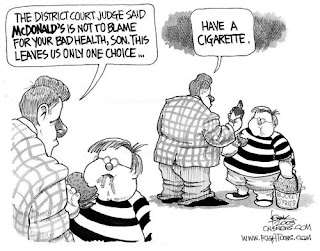 |
| naturopathicyoga.com |
Genome-wide quantitative transcriptional profiles taken from 1,240 subjects in the San Antonio Family Heart Study* (included ~300 current smokers) identified 323 unique genes whose expression pattern levels were significantly correated with smoking behavior! (provisional abstract) These genes have been implicated in immune response, cancer and cell death. The study has also suggested that smoking cigarettes can alter the expression of hundreds of white blood cell genes. As an article on GenomeWeb points out, "a comprehensive picture of how smoking affects the body has been difficult because cigarette smoke contains thousands of compounds that seem to act throughout the body".
With the current craze in the genomics world to understand how, and to what extent, environmental factors influence an individual's gene expression pattern, these findings are especially exciting. Smoking is considered an environmental factor, and we can see that just in this one study, it affects the expression of hundreds of genes and gene networks. It would be interesting to somehow assess how second-hand smoke exposure affects the genomes of individuals who have been exposed to second-hand smoke on a regular basis. I'm sure a study like that would push some places (coughvassarcough) to more rapid non-smoking policy. Speaking of, today Vanderbilt students found out that come Fall, their campus would be strictly non-smoking, and smoking would therefore be designated to specific locations on campus (where all the hipsters can gather and indulge). Let's get a move on it Vassar.
*Potential sample bias considering subjects of the study are involved in a Heart Study? Could gene expression profiles be different since subjects are in hypertension/obesity experiments? This study should probably be re-done with a random cohort, controlled for gender/SES/family history/age/smoking frequency, with equal numbers of smokers and non-smokers.
No comments:
Post a Comment